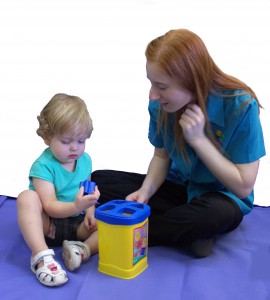
Two year olds are active and sociable and “into everything”. They should be using at least 50 single words and putting short phrases of two or three words together. Their words should include the names of people and objects, action words, describing words such as “big” and “hot” as well as words such as “gone, more, mine, up” and the two year old’s favourite word “no”. Their speech should include a range of different speech sounds including the early developing sounds: p, b, m, n, t, d, h, w and y though they may not use them correctly in all words. Not everything that they say may be clear and they may still use some babble when trying to express themselves but familiar people should understand much of what they say.
From around two years children go through a period of rapid growth in their communication skills, from a toddler experimenting with combining words to a three year old who can use sentences and hold simple conversations.
By two and a half years children can understand:
- what things are used for (what goes on your feet?)
- simple concepts such as big/little, hot/cold, in/out
- the difference between “he” and “she”
- follow simple instructions “find your shoes”
By two and a half years children can say:
- many single words and two word combinations
- some describing words “big”, “hot”
- ask some simple questions “what’s that?” ”where’s Dad?”
- use words for possession “mine, my teddy, daddy’s shoe”
- use plurals “two dogs”
- answer yes/no, what and where questions.
If you are concerned about your child’s communication development do seek the advice of a speech pathologist. Children with less than 50 words or who are not combining words together by two years are at an increased risk of developing long term speech and language difficulties, but early help can make all the difference.
How can a busy mum help develop her two year old's speech and language?
By the time children turn two many mums are back at work and things are very busy. Stay at home mums are busy at this time too, especially if there are other children in the family. Children who communicate better, interact better with others and manage their emotions and behaviour more effectively, so there are pay offs in the long run for helping your child develop good skills now. So how can you make the best use of time and still develop your child’s communication skills?
Two year old’s are developing pretend play skills so they love to copy adults. Pretend play is great for developing language and social skills, but you don’t need a giant pirate ship or fairy castle in your yard. They are happy to be alongside you, copying the things they see you do everyday. They could “cook” with a wooden spoon and some plastic bowls while you make tea, or “peg” some socks on the edge of the basket as you hang your clothes on the line. These activities which children see repeated over and over are great for teaching action words and functions, something two year olds are learning as they branch out from mainly object names to other types of words. Talk out loud as you go, about what you are doing and what you are using and your child will learn all kinds of things. “I’m cutting the carrots, chop, chop, chop” “I need something to mix the gravy, what could I use, spoons are good for mixing”
Two year old’s are also beginning to learn concepts such as size, shape, colour and position words. Sorting and tidying are great ways to practice these. As you sort the washing you could talk about size. “here are the big socks and here are the little socks. Daddy’s socks are big and yours are little.” Picking up toys could be a way to develop colours, “here is a red block, lets pick up all the red blocks first.” Putting away the dishes could help develop concepts of shape, lets put the square containers here and the round ones here.” and position “lets put the cups up the top and the pans down the bottom.” Bathing and dressing are great for learning to combine words, “arm in, leg in” “wash your face, wash your tummy”.
Read together every day. While many skills can be taught as you go through the day one thing that is really worth setting aside a few minutes each day for in a busy schedule is to read to your child. Those few minutes will pay off in the long term with more success at school and with your child developing a love of reading
If you are concerned about your child's development Our website has downloadable checklists and information about how speech pathology can help. There are also printable information sheets and activities to help you develop your child's skills.
Related Blog Posts
If you liked this post you may also like:
Looking after Mum
Preschool stuttering
What is dyslexia?
Developmental delay



